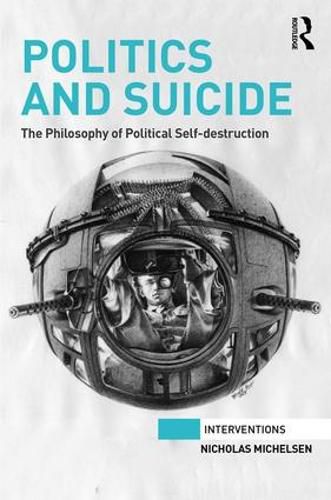Readings Newsletter
Become a Readings Member to make your shopping experience even easier.
Sign in or sign up for free!
You’re not far away from qualifying for FREE standard shipping within Australia
You’ve qualified for FREE standard shipping within Australia
The cart is loading…






Politics and Suicide argues that whilst the historical lineage of suicidal politics is recognised, the fundamental significance of autodestruction to the political remains under examined. It contends that practices like suicide-bombing do not simply embody a strange or abnormal ‘suicidal’ articulation of the political, but rather, that the existence of suicidal politics tells us something fundamental about the political as such and thinking about political violence more broadly.
Recent world events have emphatically shown our need for tools with which to develop better understandings of the politics of suicide. Through the exploration of several arresting case-studies, including the ‘Kamikaze’ bombers of World War Two, Jan Palach’s self-immolation in 1969, Cold War nuclear deterrence, and the suicide-terrorist attacks of 9/11 Michelsen asks how we might talk of a political suicide in any of these contexts. The book charts how political processes ‘go suicidal’, and asks how we might still consider them to be political in such a case. It investigates how suicide can function as ‘politics’.
A strong contribution to the fields of philosophy and international relations theory, this work will also be of interest to students and scholars of political theory and terrorism & political violence.
$9.00 standard shipping within Australia
FREE standard shipping within Australia for orders over $100.00
Express & International shipping calculated at checkout
Politics and Suicide argues that whilst the historical lineage of suicidal politics is recognised, the fundamental significance of autodestruction to the political remains under examined. It contends that practices like suicide-bombing do not simply embody a strange or abnormal ‘suicidal’ articulation of the political, but rather, that the existence of suicidal politics tells us something fundamental about the political as such and thinking about political violence more broadly.
Recent world events have emphatically shown our need for tools with which to develop better understandings of the politics of suicide. Through the exploration of several arresting case-studies, including the ‘Kamikaze’ bombers of World War Two, Jan Palach’s self-immolation in 1969, Cold War nuclear deterrence, and the suicide-terrorist attacks of 9/11 Michelsen asks how we might talk of a political suicide in any of these contexts. The book charts how political processes ‘go suicidal’, and asks how we might still consider them to be political in such a case. It investigates how suicide can function as ‘politics’.
A strong contribution to the fields of philosophy and international relations theory, this work will also be of interest to students and scholars of political theory and terrorism & political violence.